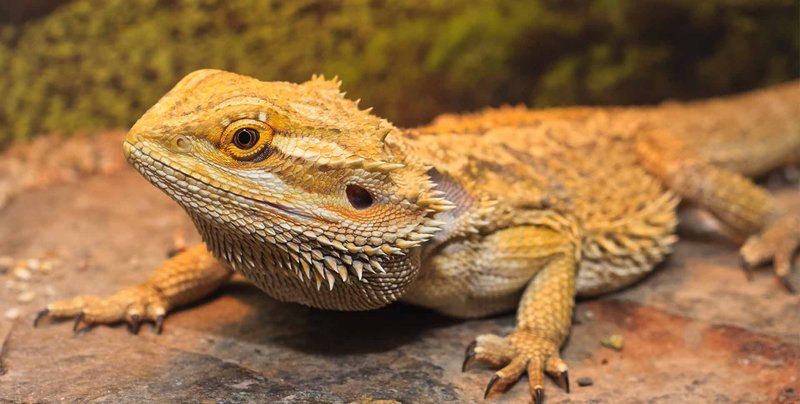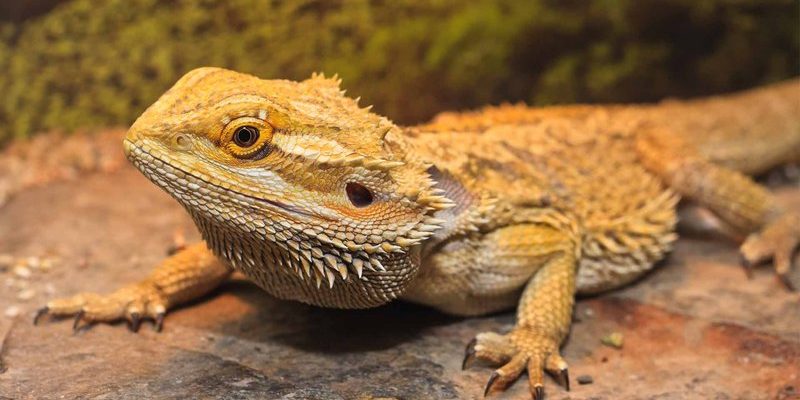
Just like passing along tales at a campfire, myths about *bearded dragons* can get exaggerated. It’s important to sift through the stories to uncover the truth. Understanding these facts not only helps current and prospective owners but also ensures these fascinating creatures get the care they really deserve. So, let’s dive in and clear up some common misconceptions.
Myth 1: Bearded Dragons Are Low-Maintenance Pets
Many people consider *bearded dragons* as easy pets, but this isn’t entirely accurate. Sure, they’re generally docile and friendly, making them wonderful companions. However, they require specific care to thrive. For instance, did you know they need a special diet? A *bearded dragon’s* menu should include a mix of live insects like crickets and mealworms, along with leafy greens. Skimping on their diet can lead to health issues.
Additionally, their habitat needs some attention. They thrive in a properly heated environment with UVB lighting. If the temperature isn’t just right or if they don’t get enough sunlight (or its equivalent in an enclosure), they can develop metabolic bone disease, which can be serious. So, while they might be friendlier than a cat or dog, they certainly aren’t maintenance-free.
Myth 2: Bearded Dragons Can Live in a Small Cage
You might be wondering just how big of a space a *bearded dragon* needs. It’s a common misconception that these reptiles can comfortably live in a tiny enclosure. In reality, adult dragons need a significantly sized habitat—ideally, a 40-gallon tank or larger. This gives them enough room to move around and express natural behaviors.
Inadequate space can lead to stress and anxiety in your pet, which might make them act out or become ill. Think of it this way: would you feel comfortable living in a cramped room all day? Just like us, *bearded dragons* need space to roam. Providing a spacious and enriched environment helps keep them happy and healthy.
Myth 3: Bearded Dragons Are Aggressive
Another common myth is that *bearded dragons* tend to be aggressive. In reality, they’re usually quite the opposite. They have a reputation for being gentle and friendly reptiles. While it’s true that some can have a feisty personality, much of this depends on their upbringing. If a *bearded dragon* is handled gently and frequently, it’s likely to grow into a calm and affectionate pet.
However, there are exceptions based on individual temperament. It’s essential to read your *bearded dragon’s* body language. A puffed-up beard or a cocked head might indicate that they’re feeling threatened or stressed. Learning to understand these signs is key to building a trusting relationship with your lizard buddy.
Myth 4: Bearded Dragons Are Not Social Creatures
You might think of reptiles as solitary creatures, but *bearded dragons* can actually be quite social. They often enjoy interaction with their human owners. Many will sit on their human’s shoulder or lap, soaking in the warmth and attention. However, it’s important to remember that they are not pack animals like dogs.
While a *bearded dragon* can bond with its owner, it’s better to handle them gently and respect their space. Overcrowding them with human interaction can lead to stress. If you’re considering getting more than one, remember that housing multiple *bearded dragons* together can lead to fights, especially if they’re of the same gender.
Myth 5: Bearded Dragons Only Need Heat
Here’s the thing: *bearded dragons* do need heat, but they also require a UVB light. Many new owners mistakenly believe that heat alone is enough. Without appropriate UVB lighting, they can suffer from serious health problems, including bone deformities.
UVB light helps them synthesize Vitamin D3, which is crucial for absorbing calcium. A lack of calcium can lead to metabolic bone disease, which is debilitating and can shorten their lifespan. So, it’s important to provide both heat and UVB in their habitat. Regularly check and replace bulbs to ensure they’re effective.
Myth 6: Bearded Dragons Are Just for Kids
There’s a stereotype that *bearded dragons* are only suitable as pets for children, but that’s far from true. While they can be great for teaching kids responsibility, many adults enjoy keeping *bearded dragons* as pets too. Their unique personality, low maintenance compared to other reptiles, and ability to bond with humans make them appealing for all ages.
In fact, adults often appreciate the calm, patient nature of a *bearded dragon*. Plus, they can serve as a conversation starter or even a stress reliever. Just keep in mind that while they’re a wonderful addition to many families, responsible ownership is crucial for their well-being.
Myth 7: Bearded Dragons Can Eat Anything
Just because they seem to munch happily on various foods doesn’t mean *bearded dragons* can have it all! Many people mistakenly think they can survive on just anything you might have in the fridge. In reality, a healthy diet consists of live insects, vegetables, and fruits.
Certain foods can be harmful to them. For example, you should avoid feeding them avocados, rhubarb, and any kind of processed human food. Always do your homework on what’s safe and healthy before feeding your dragon. Establishing a balanced diet is crucial for their health and longevity.
Myth 8: Bearded Dragons Don’t Need Regular Vet Check-ups
Last but not least, some people believe that *bearded dragons* don’t require regular vet visits. This is a significant misconception! Like any pet, *bearded dragons* should have routine check-ups to monitor their health. Reptiles are often very good at hiding illness, so preventive care is essential.
A vet that specializes in reptiles can help detect any problems early on and provide guidance on proper care, including nutrition and habitat. Regular health checks can help catch health issues before they become serious, ensuring a longer, happier life for your little companion.
In conclusion, it’s easy for myths to proliferate when it comes to *bearded dragons*. The more informed we are, the better we can care for these fascinating creatures. They may be small, but they bring so much joy and companionship. By busting these common myths, you can deepen your understanding and ensure that your *bearded dragon* has a vibrant, healthy life. Remember, knowledge is your best tool for responsible pet ownership!

